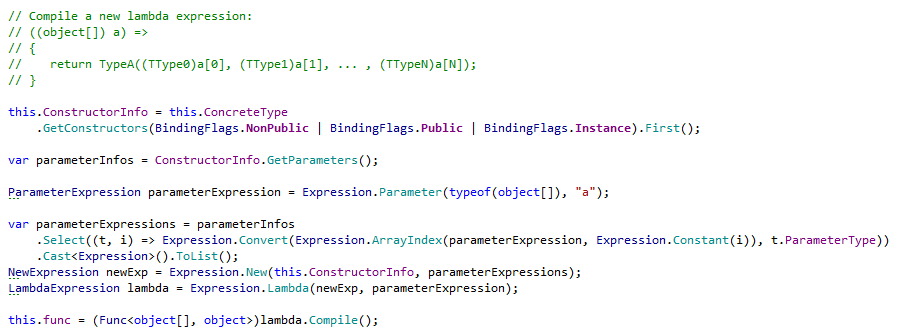How to improve performance of your own Inversion of Control Framework?
- modified:
- reading: 2 minutes
I enjoy doing anything by myself instead of using well know frameworks. I am not saying that I am using only my own frameworks. It just gives me more knowledge about how these frameworks doing their job. Inversion of Control Framework it is one of these examples. I have a blog post on Russian about simple implementation of IoC container. You can look on it here Simple IoC Container (I used Microsoft Translator for this link). Actually right now is more than just one class, I have my own framework, which I use for some my applications, like gMusic (you can follow this project on GitHub – Framework).
Couple months ago I met an article IoC Container Benchmark - Performance comparison, where this guy compare different IoC containers (when I first time met this article it was only about performance). So I decided to check performance of my simple container. This is result (I have different count of iterations, so do not compare it to the original blog post):

In this list: "Outcold" – this is my current framework, "IoC A" – it is a class which I showed in this blog post Simple IoC Container (based on Activator.CreateInstance), "IoC E" – it is a different version of IoC class, but based on Expressions (I showed in in one of my comments here). "LightInject" – it is one of the faster frameworks from original blog post about IoC performance, "Unity" – it is one of the famous frameworks. As you can see that, the version of IoC class which is based on Expressions has the worst performance. The funny thing, that I used it everywhere, I really thought that it should be faster than Activator, somebody told me… and I did not verify that…. Anyway, after this article, I spent some time to improve performance of my IoC container, and this is how I did this.
The main problem of IoC container which I implemented is that I did not cache the compiled Expression. Each time when I ask IoC to resolve some object – it compiles expression and after this resolve it:
First optimization is simple. Just need to cache expression after first time somebody will ask to resolve object. However, first I need to change how I invoke constructor, because my expression expects constraints I need to change it to parameters, so each "resolving" can use it is own parameters:

Now I have Delegate, which can create for me a new object of specific type. The only one problem, that this delegate can have different set of parameters, so I cannot cast it to something like Func<Type1, … , TypeN, Result> and invoke it. I need to call DynamicInvoke, which is slow:

This is the result of this optimization (as you can see it is very good, but still variant with Activator works better):

The second step I made – I just changed Expression in such way, so it always takes just one parameter "array of objects". In expression I use this array to cast each item of this array to the parameter in constructor. This is how I do this:

This is the result:

It is faster than version with Activator! But it still slower than LightInject. I guess it is because LightInject used before System.Reflection.Emit instead of Expressions, or maybe they have better idea how to create this expression for type resolving.
Anyway, it was a good result for me.